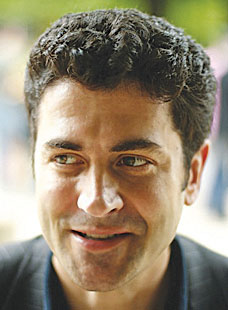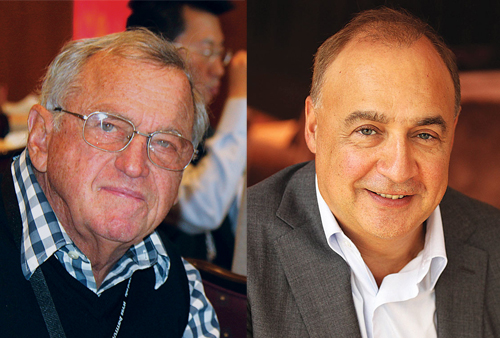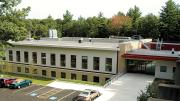Primate Denouement
Harvard Medical School (HMS) plans to wind down operations of the New England Primate Research Center, in Southborough, Massachusetts. The school cited financial pressures; Carolyn Y. Johnson, of The Boston Globe (who earlier reported on the center’s lapses in animal care, federal warnings, and ensuing changes in operations—and wrote “Animal Research Reforms” for this magazine, May-June 2012, page 45), cited an HMS estimate of $25 million needed to sustain the facility. In the meantime, with federal research funding declining, HMS appears to be focusing on human research frontiers (see “Systematic Drug Discovery,” page 54). Provisions need to be made for the nearly 2,000 animals at the facility; about 200 faculty members, postdoctoral researchers, and staff employees will also be affected. See www.harvardmag.com/primates-13 for details.
The Marathon Bombing
Among the three victims killed in the terrorist bombing at the Boston Marathon on April 15 was Krystle Campbell, daughter of long-time Harvard Business School Restaurant Associates employee Patty Campbell and sister of Cabot House dining-services staffer Billy Campbell. Krystle Campbell had herself worked for HBS Restaurant Associates while she was in college; she was remembered in a campus observance led by Dean Nitin Nohria. In a cruel twist, the surviving suspect in the bombings, Dzhokhar Tsarnaev, reportedly worked as a lifeguard at Malkin Athletic Center as a high-school student in Cambridge. Finally, among the lawyers assigned to represent Tsarnaev is Miriam Conrad, J.D. ’87, the highly respected head of the Boston Federal Public Defender Office.
Visitas Derailed
With Boston and environs locked down during the day-long manhunt for terrorist suspects on April 19, the Visitas campus orientation program for admitted undergraduates was suspended, with many students en route. The admissions office coped by transporting some of the arrivals to hotels, while undergraduates shared information about campus life with the pre-frosh via VirtualVisitas. The impact on the yield was apparently nil: of 2,029 candidates offered admission to the class of 2017, some 82 percent accepted—the highest yield since 1973. (Separately, according to The Choice, The New York Times blog on admissions, Stanford’s admissions rate was actually lower than Harvard’s this year: 5.7 percent in Palo Alto, 5.8 percent in Cambridge. In 2012, it was Crimson 5.9 percent, Cardinal 6.6 percent.)
Sexual-Orientation Matters
After he was widely reported to have said that John Maynard Keynes was indifferent to the long-term effects of his economic theories because he was homosexual and childless, Tisch professor of history Niall Ferguson made several apologies, written and in person. In The Crimson of May 8, he also assailed his “vituperative online critics,” some of whom wrote about the conservative trope of attacking Keynes based his sexual orientation. The Boston Globe noted that Ferguson had himself gone into footnoted detail about Keynes’s sexuality (in chapter 11 of his 1999 book, The Pity of War). Separately, the Harvard Gay and Lesbian Caucus is changing its name to the Harvard Gender and Sexuality Caucus at the end of the academic year. And on income-tax day, the University announced that it would extend tax-equalization payments of $1,500 to faculty and staff members and postdoctoral fellows whose same-sex spouse (or same-sex domestic partner in states that do not recognize same-sex marriage) is covered under a Harvard family medical plan.
Earnings Update
Harvard Management Company has reported calendar-year 2011 compensation for its president and top-earning portfolio managers: Jane L. Mendillo, president and CEO, $5.3 million; Andrew G. Wiltshire, alternative assets, $6.6 million; Stephen Blyth, public markets, $6.2 million; Alvaro Aguirre-Simunovic, natural resources, $5.3 million; Apoorva K. Koticha, fixed income, $3.1 million; and Marco C. Barrozo, fixed income, $3.0 million. Separately, the University’s tax return for its fiscal year ended June 30, 2012, revealed that President Drew Faust’s salary was $729,000, plus other compensation (principally, use of Elmwood, the presidential residence) of $171,000. Other reported salaries, for the executive vice president and various vice presidents, ranged from $579,000 to $265,000. For details, see https://harvardmag.com/pay-13. As previously reported, Faust last year joined the board of directors of Staples, Inc., the office-supplies retailer. The company reported the value of her pro-rated cash compensation and stock awards during 2012 as $275,000.
On Other Campuses
Echoing Yale, Princeton tapped its long-time provost, Christopher L. Eisgruber, a constitutional scholar, to succeed Shirley M. Tilghman, who became president in 2001. He has published a pair of books with Harvard University Press.…Much farther afield, private-equity executive Stephen A. Schwarzman, M.B.A. ’72, of the Blackstone Group, has donated $100 million and is raising $200 million more to endow a Rhodes Scholarship-like program to bring 200 international students annually to Beijing, for one-year master’s programs at Tsinghua University.…As neuroscience research accelerates (see “Mapping the Way to a Brain Survey,” page 9), Columbia recently secured a $200-million gift to fund work in the field and the University of Southern California trumpeted hiring leading neurology professors away from UCLA, to anchor a new neuroinformatics institute for brain mapping and imaging.
Competing Campaigns
As the public launch of The Harvard Campaign nears, other institutions suggest the scale of higher-education philanthropy today. Johns Hopkins unveiled its $4.5-billion “Rising to the Challenge” effort, following a $3.7-billion drive that concluded in 2008 (much of it focused on medicine and on facilities). The new drive, begun with 43 percent of the goal in hand, seeks nearly $700 million for financial aid, as well as funding to endow 300 professorships atop the current 385. Interdisciplinary priorities include programs on global health, urban challenges, and education and the science of learning.…Cornell secured a second nine-figure gift for its technology campus on New York City’s Roosevelt Island: alumni Irwin Jacobs, co-founder of Qualcomm Inc., and his wife, Joan Jacobs, have donated $133 million.…Columbia received a second $100-million gift for the business-school facilities at its new Manhattanville campus. The donor is Ronald O. Perelman, chairman and CEO of Mac-Andrews & Forbes Holdings Inc., and a member of the school’s board of overseers. Diller Scofido + Renfro are designing the two new buildings.…Charles T. Munger, vice chairman of Berkshire Hathaway Inc., gave the University of Michigan, his alma mater, $110 million for a graduate-student residential commons and fellowships.
Nota Bene
Bond blessing. Taking advantage of favorable market conditions, the University in April issued $402 million of taxable bonds, maturing variously in 2023, 2031, and 2037, at interest rates scaling up from 2.3 percent to 3.619 percent. The proceeds are being used to refund all of a 30-year issue of similar bonds issued in 2006 at a 6.3 percent interest rate.
Pulitzer honorands. Tom Reiss ’86 won the 2013 Pulitzer Prize for his biography of Alex Dumas (the basis for the Vita published in this magazine’s November-December 2012 issue, page 30). Staff reporters of the online InsideClimate News, founded by David Sassoon ’79, won the national-reporting prize for coverage of the regulation of oil pipelines. Finalists included Adams University Professor emeritus Bernard Bailyn (history), for The Barbarous Years (reviewed in the January-February issue, page 20); Juliette Kayyem ’91, J.D. ’95, a Harvard Kennedy School lecturer, for her Boston Globe columns (commentary); and Globe reporter Patricia Wen ’80, as part of a team that covered compounding pharmacies (national reporting).
Anchoring architecture. Iñaki Ábalos has been appointed chair of the department of architecture at the Graduate School of Design. A founding member of Ábalos + Sentkiewicz Arquitectos, based in Madrid, he has previously taught studios and lectured at the school.

Photograph courtesy of Tom Reiss
Tom Reiss
Miscellany. William Russo has been appointed managing director of the American Repertory Theater, joining artistic director Diane Paulus in leading the nonprofit organization. He comes to Cambridge from the New York Theatre Workshop.…President Barack Obama has nominated Penny S. Pritzker ’81 as U.S. Secretary of Commerce.…The Honorable Margaret H. Marshall, Ed.M.’69, Ed ’77, L ’78—a graduate of Yale Law School—has been appointed Senior Fellow of the Yale Corporation. She is the first woman and Yale Law graduate to hold that position—and the first person born outside the United States: a native of South Africa, she became a U.S. citizen in 1977. (Marshall is also an Incorporator of this magazine.)… Medical-software company athenahealth inc. completed its acquisition of the Watertown Arsenal complex, along the Charles River, from the University, for $168.5 million. The company is headquartered there.

Galvanizing Gifts
The University announced in May that Hansjörg Wyss has made a second, $125-million gift (complementing one in 2008) to support the Wyss Institute for Biologically Inspired Engineering, which focuses on developing new medicines and technologies for commercial application. It now engages 27 affiliated faculty members and a staff of more than 350 people, occupying 100,000 square feet of research space; see further details at https://harvardmag.com/wyss-13. The Blavatnik Family Foundation, led by Len Blavatnik, M.B.A. ’89, has given Harvard $50 million; the funds, following an earlier, $5-million gift, will enable the Office of Technology Development to scale up the University’s Biomedical Accelerator Fund, launched in 2007, now renamed for the donor. It is an investment vehicle that encourages further work on academic discoveries so they can become suitable for commercial development. The gift will also underwrite postgraduate life-sciences-entrepreneurship fellowships at Harvard Business School. See a full report at https://harvardmag.com/blavatnik-13. And long-time Harvard benefactor Sidney R. Knafel ’52, M.B.A. ’54, has given the Radcliffe Institute for Advanced Study a gift of $10.5 million to convene scholars from around the University and across the world to work together, and to support public programs. The renovated Radcliffe Gymnasium, now a conference facility, has been renamed the Knafel Center.









